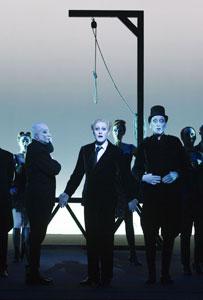
Swinging London: Macheath (Stefan Kurt, center)
about to be hanged in Act III of Threepenny Opera.
Photo by Leslie Leslie-Spinks © 2011 Brooklyn Academy of Music.
It is entirely appropriate that this year's NextWave Festival at the Brooklyn Academy of Music chose to mount the acerbic Three- penny Opera (in a production by the Berliner Ensemble and Robert Wilson) during the Occupy Wall Street protests. Coincidence, but entirely appropriate.
Berthold Brecht and Kurt Weill's Jazz-Oper is well known in this country as the source of "Mack the Knife", a jazz standard and a pop hit for Bobby Darin in 1959. In this production, using the original German text and the bare-bones vision of director Robert Wilson, Threepenny regains its sharp teeth. Brecht's bitter commentary about man's inhumanity was especially resonant last night--the audience roared approval at that line about bankers being worse than murderers.
Mr. Wilson's staging emphasizes Brecht's "theater of alienation." His production removed most of the sets, trappings and even props from the action, forcing the listener to focus on the text. The effect: this sordid tale of London's back alleys (based on The Beggar's Opera by British composer John Gay) becomes a strange, alien ritual, conducted by just-landed extraterrestrials with the rogue Macheath as the sacrificial victim.
The cast was anchored by Stefan Kurt's Macheath. He sang "Mack the Knife" as a drag cabaret turn in front of a black curtain that slowly lit up with spinning circles of amber lights. This is not your standard opera-style singing, but Mr. Kurt embodied the character with cynicism, warmth and energy. His Macheath was a homicidal dandy-about-town who owed something to Jack Nicholson's portrayal of the Joker in the 1989 Tim Burton film Batman.
Jürgen Holtz made the beggar king Jonathan Peachum an unmusical, if entertaining figure, accompanied by Traute Hoess as his wife. Axel Werner had a strong evening as venal (but honorable) London police chief Tiger Brown, displaying a smooth baritone and a resonant speaking voice. And despite (deliberate) shrill, screaming moments, the Act II prison scene, (when Lucy (Anna Graenzer) and Polly (Stefanie Steppenbeck) discover that they're both married to Mack) was a highlight.
As usual, Mr. Wilson puts his actors in white Kabuki-style makeup and black, sometimes androgynous costumes by Jacques Reynaud. The action (moving quickly, for a Wilson production) takes place against simple, rectangular shapes and a flat cyclorama with a shifting palette of colored light. The costuming played up the ambiguity and interchangeability of the characters, particularly Polly and Lucy.
The small orchestra played Kurt Weill's jazz-inflected score with enthusiasm. The only hitch: over-loud amplification for the singers (deafening in the superb acoustics of the BAM Opera House) and ear-splitting sound effects (prison doors, coins being exchanged, etc.) The high-volume effects added to the sense of alienation, but made sitting through the three-hour work a test of audience patience and endurance.

